De Duitse dichter en schrijver Walter Rheiner (eig. Walter Heinrich Schnorrenberg) werd geboren op 18 maart 1895 in Keulen. Zie ook alle tags voor Walter Rheiner op dit blog.
Toten-Messe
Nun liegen ihre Leiber halb verscharrt,
geborsten und verwittert tief im Sand.
Verworren züngelt Haar, hoch wächst die Hand,
greift in die Nacht, die auf den Zinnen harrt.
Verkohlte Städte schwelen lang vorbei,
und Brücken flattern schief und ausgezackt.
Die Sonne stürzt, schäumender Katarakt,
auf morsche Schädel, Augen fahl wie Blei.
Durch ihre Zähne pfeift ein süßer Wind,
der warm und rosig ist von frischem Blut.
(- In Abendröten weiden Lämmer gut. -)
Schon quellen sie verwesend aufwärts lind,
durchdringen, Freunde, sich mit ihrem Duft,
umarmen sich in lächelnder Spirale.
Die kühlen Sterne sind mit einem Male
ganz nah und kreisen singend durch die Luft.
Im Rauch verbrannter Zimmer nisten sie sich ein.
Sie fahren aufgelöst durch Ozeane.
Erkennen unten Schiffe, zitternd klein:
sie, des Planeten großgewölbte Fahne.
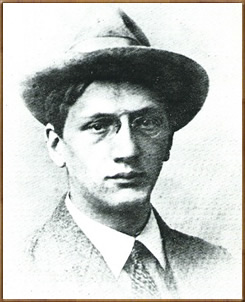
Walter Rheiner (18 maart 1895 – 12 juni 1925)
De Sloveense dichter en schrijver Srečko Kosove werd geboren in Sezana op 18 maart 1904. Zie ook alle tags voor Srečko Kosovel op dit blog.
In Silver Moonlight
A dark boat floats
in silver moonlight,
from the green harbour
a boatman set sail,
– from the green crystal
of a silent heart.
From the heart of midnight.
The leaves did not move
as if still in a dream,
alone by the shore
green they lean.
Each night on a silver ocean
the young boatman
dreams to and fro,
but back to the harbour
he’ll never go.
The Marked
They walk with death in their hearts.
Death wakes in their eyes.
A car spattering mud.
Heads droop with no energy.
A light rain of evil falling into the eyes.
The lava of weariness.
Delirium tremens.
Hunger.
Starvation, starvation.
Oh, your white hands!
Like a rustling dream you pass by!
Vertaald door Nike Kocijancic Pokorn
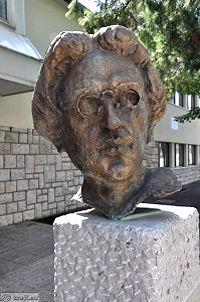
Srečko Kosovel (18 maart 1904 – 27 mei 1926)
Borstbeeld in Sezana, Slovenië
De Franse schrijver Jean Anglade werd geboren op 18 maart 1915 in Bonnets bij Thiers. Zie ook alle tags voor Jean Anglade op dit blog.
Uit: Confidences auvergnates
« Dans les vieilles rues de Thiers la coutelière, devenues une casbah; au milieu de paysans sans vaches et de vaches sans paysans; près des grands barrages de la Dordogne et de la Truyère ; sur le puy de Dôme lui même, qui fut jadis un jardin, transformé de nos jours en place publique. Je lui faisais entendre les Vichyssois pleurant les fastes perdus de leur ville, reine détrônée des villes d’eau; les sacrifiés de Naussac ; les vignerons d’Issoire qui, le matin, binent leur vigne, et l’aprèsmidi manceuvrent un clavier électronique chez CEGEDUR.
Un tel ouvrage devrait être remis à jour au moins tous les dix ans. Il est certain qu’une région qui n’évolue pas dans le bon sens, entourée d’un monde en perpétuel grouillement, est un désert en perspective. Voyez de larges étendues ainsi condamnées en Afrique, en Asie, en Amérique du Sud.
Mais qu’est-ce au juste que le ” bon sens ” dans le changement ? Les polytechniciens, les énarques qui nous gouvernent pensent d’abord à la prospérité économique et quantitative. Leur programme : jeter sur le marché la plus grande masse possible d’un produit déterminé, blé, tomates, viande, pneus, automobiles. Reste la question du prix. Il doit posséder deux caractères contradictoires: être élevé pour le producteur et bas pour le consommateur. Because concurrence. Celle des japonais, des Hollandais, des Italiens. Pourquoi la concurrence étrangère est-elle insupportable ? Parce qu’elle est toujours déloyale. Toute concurrence est déloyale. Ses armes sont le dumping, les hormones, la main-d’oeuvre bon marché, les charges sociales inexistantes, l’activité souterraine, les pots de vin. »
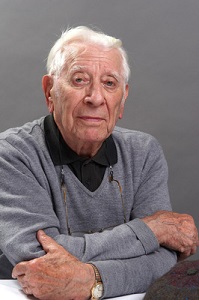
Jean Anglade (Bonnets, 18 maart 1915)
De Amerikaanse schrijver George Ames Plimpton werd geboren op 18 maart 1927 in New York. Zie ook alle tags voor George Plimpton op dit blog.
Uit: Paper Lion
“I decided finally to pack the football. It was a slightly used Spalding ball, an expensive one, with the information printed on it that it was “triple-lined and lock-stitched.” Its sponsoring signature was that of Norman Van Brocklin, the ex–Philadelphia Eagle quarterback. It seemed a little deflated. I pressed it down hard against the shirts and was able to get the canvas suitcase cover zipped up around it. It was the bulkiest item in the suitcase, and the bulge of it was noticeable. I had two sweat suits in there, a pair of football shoes, some socks, a book on football formations written by a high-school coach, a sports coat and some trousers, and a few other things. I was not sure what I was going to need at the training camp. The Detroit Lion officials had not sent me the sort of list one remembered from boys’ camp—that one should bring a pillowcase, a mattress cover, a flashlight, a laundry bag, etc. I assumed I could buy what I was lacking at the nearest town. I carried the suitcase down to the street and went out to Kennedy airport to catch an airplane to Detroit. From there I would go by car an hour north to Cranbrook, a boys’ private school near Bloomfield Hills, whose athletic facilities were being used by the Detroit Lions for their preseason training. I was going there as the Lions’ “last-string quarterback”—as my friends referred to it—to join the team as an amateur to undergo firsthand the life of the professional and, hopefully, to describe the experience in a book. I had written one such book—a recounting of my turbulent experiences pitching in Yankee Stadium in a postseason major-league All-Star game. Out of MI League the book was called, and it described what happened to someone with the temerity to climb the field-box railings to try the sport oneself, just to see how one got along and what happened. The notion behind the book was to play out the fantasies, the daydreams that so many people have—seeing themselves on the center court at Wimbledon, or sinking long putts in the U.S. Open, or ripping through the Green Bay secondary. I had been able to arrange with the baseball game’s promoters to play. Ernest Hemingway had thought it an odd if interesting experiment and he described the difficulties of my participation as “the dark side of the moon of Walter Mitty.”
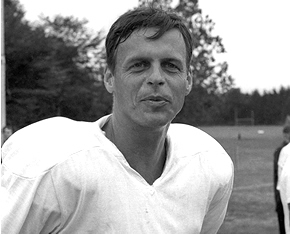
George Plimpton (18 maart 1927 – 25 septem 2003)
De Engelse dichter en kunstcriticus William Cosmo Monkhouse werd geboren op 18 maart 1840 in Londen. Zie ook alle tags voor Cosmo Monkhouse op dit blog.
A Song Of The Seasons
Sing a song of Spring-time,
The world is going round,
Blown by the south wind:
Listen to its sound.
‘Gurgle’ goes the mill-wheel,
‘Cluck’ clucks the hen;
And it’s O for a pretty girl
To kiss in the glen.
Sing a song of Summer,
The world is nearly still,
The mill-pond has gone to sleep,
And so has the mill.
Shall we go a-sailing,
Or shall we take a ride,
Or dream the afternoon away
Here, side by side?
Sing a song of Autumn,
The world is going back;
They glean in the corn-field,
And stamp on the stack.
Our boy, Charlie,
Tall, strong, and light:
He shoots all the day
And dances all the night.
Sing a song of Winter,
The world stops dead;
Under snowy coverlid
Flowers lie abed.
There’s hunting for the young ones
And wine for the old,
And a sexton in the churchyard
Digging in the cold.
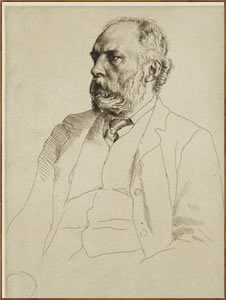
Cosmo Monkhouse (18 maart 1840 – 20 juli 1901)
Portret door William Strang, 1892
De Duitse schrijver Friedrich Nicolai werd geboren op 18 maart 1733 in Berlijn. Zie ook alle tags voor Friedrich Nicolai op dit blog.
Uit: Geschichte eines dicken Mannes
„Die merkwürdigen sieben dicken Männer, mit welchen man unsern Helden etwa möchte vergleichen wollen, wären: Thersites im Altertume und in neuern Zeiten Sancho Pansa, Falstaff, der Kanonikus Gil Perez, Oheim des berühmten Gil Blas de Santillana, der dicke Mann auf Otaheiti, der so vornehm war, daß er sich mit gehöriger Gravität täglich von seinen Weibern das Essen in den Mund stopfen ließ, und zwei dicke kurze Personen im Tristram Shandy, nämlich Doktor Slop, der Geburtshelfer, und der kleine Trommelschläger mit säbelförmigen Beinen, der am Tore zu Straßburg auf der Wache war, als ein Fremder hereinritt, kommend vom Vorgebirge der Nasen, mit der größten Nase, von welcher Welt und Nachwelt keinen Begriff haben würden, wenn der berühmte Hafen Slawkenbergius nicht Sorge getragen hätte, sie ganz genau zu beschreiben.
Diesem Trommelschläger gleicht unser Held nun auf gar keine Weise; denn er hat keinesweges säbelförmige, sondern gesunde ganz gerade Beine, mit netten Waden, wohlgeformt gleich den Waden des Apoll von Belvedere. Weder wurstförmige Waden, welche zufolge der Bemerkung des Physiognomisten Johannes Baptista Porta eine Eigenschaft der hagedornschen Schnarcher voller Schulgeschwätze sind, die jedem Naemanns Krätze gönnen, der von ihrem Systeme abweicht, noch schlotterige, gleich den Waden weiland Johann Kaspar Kubachs, des Gebethelden, der mit seinem Gebete nie Wunder getan hat.
Dem Doktor Slop, mögt Ihr ihn Euch auch denken wie Ihr wollt, ist unser Held gleichfalls nicht im mindesten ähnlich. Seht den Doktor nur an, es sei wie ihn Hogarth [Fußnote] schlafen läßt, oder wie ihn Chodowiecki vom Pferde wirft; und Ihr müßt gleich merken, Anselm Redlich müsse ein ganz anderes Kerlchen sein. Ihr werdet weiter unten finden, er ist rundlich, niedlich, witzig, gelehrt, galant, dem Frauenzimmer ergeben und nebenher zuweilen ein wenig ein Hasenfuß, unbeschadet seiner Sittsamkeit, Gelehrsamkeit und besonders seiner Klugheit, auf die er wohl, wie auch weiter unter erhellen wird, selbst einigen Wert setzen mag. Ein solches Männchen schläft ganz anders und fällt ganz anders vom Pferde als eine so plumpe Masse wie Doktor Slop.“

Friedrich Nicolai (18 maart 1733 – 8 januari 1811)
Cover
